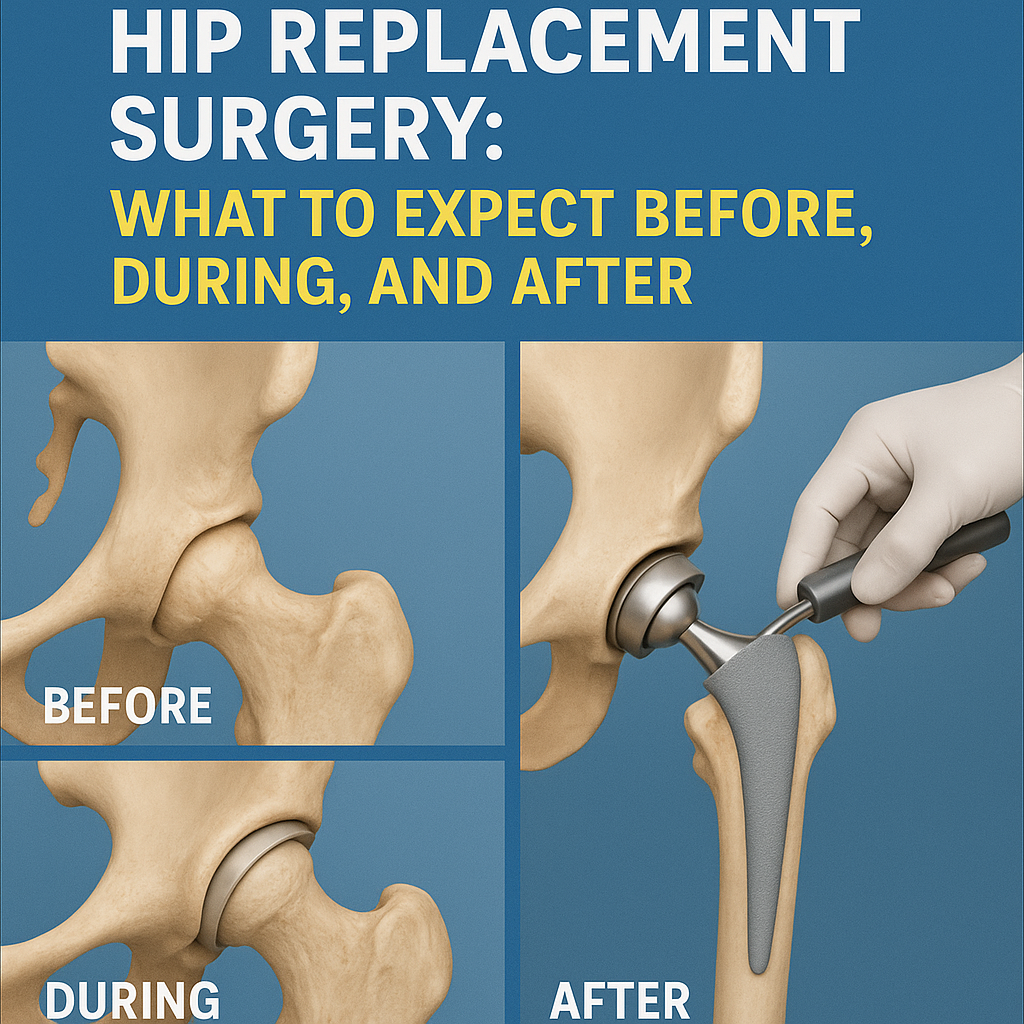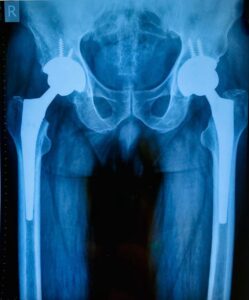Written by Dr. S. Kumar Singh | Octavia Hospital 📖 Introduction: The Road to a Pain-Free Life with Hip Replacement Surgery Hip pain caused by arthritis, fractures, or other conditions can significantly impact your …

Hip Replacement Surgery: What to Expect Before, During, and After
Written by Dr. S. Kumar Singh | Octavia Hospital
📖 Introduction: The Road to a Pain-Free Life with Hip Replacement Surgery
Hip pain caused by arthritis, fractures, or other conditions can significantly impact your quality of life. Everyday activities, like walking, sitting, or even standing, can become painful and challenging. For those who have tried conservative treatments without relief, hip replacement surgery may be the best option to regain mobility and ease pain.
At Octavia Hospital, our Orthopedic Surgeon Dr. Santosh Kumar Singh specializes in performing total hip replacement (THR) and partial hip replacement surgeries. With years of experience, Dr. Singh is dedicated to helping patients understand the surgical process, manage expectations, and achieve a smooth recovery.
This guide will walk you through what to expect before, during, and after hip replacement surgery, so you can approach your procedure with confidence and clarity.
🔍 What to Expect Before Hip Replacement Surgery
1️⃣ Preoperative Assessment and Preparation
Before your surgery, you’ll undergo a thorough preoperative evaluation. This will involve:
- A physical examination to assess your overall health.
- Blood tests, imaging scans, and potentially an EKG to ensure your heart is in good shape for surgery.
- Consultations with the surgical team, including anesthesia and nursing staff, to discuss any concerns.
Dr. Singh advises: “It’s important to be honest about your medical history and any medications you’re currently taking. This helps us plan the safest procedure for you.”
2️⃣ Lifestyle Adjustments and Pre-Surgery Tips
You may be asked to make some lifestyle adjustments before surgery. For example:
- Stop smoking if you are a smoker, as smoking can slow down the healing process.
- Limit alcohol consumption, as it can interfere with anesthesia and medications.
- Follow specific exercise routines that your doctor may recommend to strengthen your muscles around the hip and improve flexibility.
Dr. Singh emphasizes: “Preparing physically can help reduce the risk of complications and improve your recovery after surgery.”
🏥 What to Expect During Hip Replacement Surgery
1️⃣ The Surgical Procedure: Total or Partial Hip Replacement?
Hip replacement surgery involves removing the damaged hip joint and replacing it with a prosthetic. There are two main types:
- Total Hip Replacement (THR): Both the hip socket and the ball of the femur are replaced with artificial components.
- Partial Hip Replacement: Only the ball (femoral head) is replaced if the socket remains intact.
During the surgery, you’ll be under general anesthesia or spinal anesthesia, which numbs your lower body. The procedure usually lasts between 1-2 hours, depending on the complexity of the case.
Dr. Singh explains: “We use advanced techniques, to minimize recovery time and reduce complications.”
2️⃣ What Happens During the Surgery?
- Incision: A small incision is made on the side of your hip.
- Removal of Damaged Joint: The surgeon carefully removes the damaged cartilage and bone.
- Prosthetic Insertion: The prosthetic components are carefully fitted into the bone. The ball and socket are tested for stability, and the incision is closed.
🏠 What to Expect After Hip Replacement Surgery
1️⃣ Recovery in the Hospital
After the surgery, you’ll be monitored in the recovery room until the anesthesia wears off. You can expect:
- A short hospital stay of 2-3 days, depending on your recovery and overall health.
- Pain management: Pain relief will be provided through medications to keep you comfortable.
- Physical therapy (PT): Physical therapy will begin the day after surgery. You’ll learn how to move safely, strengthen your muscles, and regain mobility.
Dr. Singh advises: “It’s essential to start moving as soon as possible to prevent blood clots and promote faster recovery.”
2️⃣ Postoperative Care and Rehabilitation
- Physical Therapy: After leaving the hospital, home-based or outpatient physical therapy will be key to your recovery. Rehabilitation will focus on restoring strength, flexibility, and range of motion.
- Walking Aids: You may need crutches, a walker, or a cane for several weeks.
- Medication: You’ll be given pain medications and possibly blood thinners to prevent complications such as deep vein thrombosis (DVT).
Tips for a Speedy Recovery:
- Stay active: Gradually increase your activity level based on your physical therapist’s recommendations.
- Monitor for complications: Contact your doctor if you notice signs of infection (fever, redness, swelling) or other complications.
3️⃣ Long-Term Recovery and Life After Hip Replacement
1️⃣ Return to Normal Activities
You will gradually be able to return to everyday activities. However, full recovery typically takes about 6-12 weeks, and resuming high-impact activities (like running or heavy lifting) should be avoided for the first few months.
Dr. Singh notes: “Many of our patients report significant improvements in their quality of life after surgery, with reduced pain and enhanced mobility.”
2️⃣ Lifestyle Modifications and Joint Care
To extend the lifespan of your artificial hip, it’s important to:
- Maintain a healthy weight to reduce stress on the joint.
- Exercise regularly, focusing on low-impact activities like walking, swimming, or cycling to strengthen muscles around the joint.
- Avoid excessive twisting or high-impact movements that could damage the prosthetic.

📌 Final Thoughts from Dr. S. Kumar Singh
Hip replacement surgery — whether Total or Partial — stands as one of the most transformative and rewarding Orthopedic procedures in modern medicine. This operation has given countless individuals a second chance at a pain-free, active life and renewed independence — so much so that it has earned the title of the ‘Operation of the Century‘ to its life-changing outcomes and remarkable patient satisfaction worldwide.
Hip replacement surgery can be life-changing, providing pain relief, improved mobility, and a return to an active lifestyle. With the right preparation, surgical care, and rehabilitation, you can enjoy a pain-free life again.
At Octavia Hospital, we are committed to providing you with the highest quality of care before, during, and after surgery. Dr. S. Kumar Singh and our expert team are here to support you through every step of your hip replacement journey.
If you’re experiencing hip pain that’s interfering with your daily life, don’t wait—schedule a consultation with us today to explore your treatment options.







